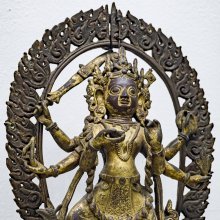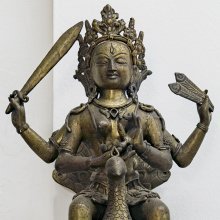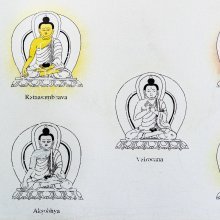Mayura, Mayūra, Māyūra: 37 definitions
Introduction:
Mayura means something in Buddhism, Pali, Hinduism, Sanskrit, Jainism, Prakrit, the history of ancient India, Marathi, Hindi, biology. If you want to know the exact meaning, history, etymology or English translation of this term then check out the descriptions on this page. Add your comment or reference to a book if you want to contribute to this summary article.
Mayura has 35 English definitions available.
Images (photo gallery)
Languages of India and abroad
Sanskrit dictionary
[Deutsch Wörterbuch]
Source: Cologne Digital Sanskrit Dictionaries: Böhtlingk and Roth Grosses Petersburger WörterbuchMayūra (मयूर):—(von mā, mimāti) [Uṇādisūtra 1, 68] (proparox.; vgl. jedoch [Pāṇini’s acht Bücher 4, 2, 44,] [Scholiast]). gaṇa pṛṣodarādi zu [Pāṇini’s acht Bücher 6, 3, 109.]
1) m. a) Pfau [Amarakoṣa.2,5,30.] [Trikāṇḍaśeṣa.2,5,26.] [Hemacandra’s Abhidhānacintāmaṇi 1319.] [Anekārthasaṃgraha.3,593.] [Medinīkoṣa r. 200.] [Halāyudha.2,86.] [Vājasaneyisaṃhitā 24,23. 27.] [LĀṬY.8,12,6.] [Weber’s Indische Studien.4,108.8,267.] [Harivaṃśa 10775. fg.] [Rāmāyaṇa.3,79,15. 16.] [Suśruta.1,74,18. 114,10. 201,1. 228,13.] [Raghuvaṃśa.3,56.] [Ṛtusaṃhāra.1,13.] [Śākuntala 105,1.] [?ad 78. Spr. 2504. WEBER, Jyotiṣa 21. Weber’s Verzeichniss No. 897. Oxforder Handschriften 86,b,38. 92,b,40. 123,a,18.] varamadya kapoto na śvo mayūraḥ [216,a,41.] piccha [Śārṅgadhara SAṂH. 3, 9, 10.] dhvaja [Weber’s Verzeichniss No. 434 (LXI).] citraka n. Titel des [47ten] Adhyāya in [Varāhamihira’s Bṛhajjātaka S.]; vgl. barhicitraka [47, 2.] rāja [Hiouen-Thsang I, 138.] mayūrī f. Pfauhenne [Ṛgveda 1, 191, 14.] [Atharvavedasaṃhitā 7, 56, 7.] [Rāmāyaṇa 3, 79, 15.] [Kathāsaritsāgara 29, 180.] [UTTARARĀMAC. 41, 8.] [Pāṇini’s acht Bücher 1, 2, 67, Scholiast] mayūratva n. nom. abstr. [Kathāsaritsāgara 71, 277. 301.] mayūrībhū [284.] — b) Hahnenkamm, Celosia cristata [Amarakoṣa 2, 4, 3, 30.] [Hemacandra’s Anekārthasaṃgraha] [Medinīkoṣa] Achyranthes aspera (s. apāmārga) [Hemacandra’s Anekārthasaṃgraha] [Medinīkoṣa -] [Suśruta 2, 134, 21.] — c) ein best. zur Bestimmung der Zeit dienendes Instrument [Sūryasiddhānta 13, 21.] — d) Nomen proprium eines Asura [Mahābhārata 1, 2671.] eines Dichters [HALL] in der Einl. zu [VĀSAVAD. S. 7. 8. 21. 49.] [Oxforder Handschriften 124,a,1. 50. 142,a,13. 150,b,32. 258,b,15. 348,b, No. 819.] Vaters eines Śaṅku [125,a,4.] — e) Nomen proprium eines Berges [Mārkāṇḍeyapurāṇa 55, 13.] —
2) f. ī a) Pfauhenne; s. u. 1,a. — b) ein best. Gemüse, Basella rubra u.s.w. [WILSON] nach [ŚABDĀRTHAK.] —
3) n. (sc. āsana) a) eine best. Art zu sitzen [Oxforder Handschriften 234,a,19.] — b) Nomen proprium einer Stadt [Hiouen-Thsang I, 230.] — Vgl. mattamūyara fg., mahāmayūrī, māyūra, māyūrika .
--- OR ---
Māyūra (मायूर):—(von mayūra)
1) adj. f. ī dem Pfau eigen, von ihm kommend [Pāṇini’s acht Bücher 4, 3, 154,] [Scholiast] guṇa [Mahābhārata 12, 4364.] parṇa [9817.] [PAÑCAR. 3, 11, 4.] māṃsa [Mahābhārata 13, 5047.] [Rāmāyaṇa 2, 91, 65 (100, 63 Gorresio).] [Suśruta 2, 251, 2.] aus Pfauenfedern gemacht [Varāhamihira’s Bṛhajjātaka S. 43, 44. 73, 5.] von Pfauen gezogen (oder aus Pfauenfedern gemacht): ratha [Harivaṃśa 11032.] Pfauen lieb [Mālavikāgnimitra 20.] —
2) f. ī eine best. Pflanze, = ajamodā [Rājanirghaṇṭa im Śabdakalpadruma] —
3) n. Taubenschwarm [Pāṇini’s acht Bücher 4, 2, 44,] [Scholiast] [Amarakoṣa 2, 5, 43.] [Hemacandra’s Abhidhānacintāmaṇi 1415.] — Vgl. mahāmāyūrī .
Source: Cologne Digital Sanskrit Dictionaries: Sanskrit-Wörterbuch in kürzerer FassungMayūra (मयूर):——
1) m. — a) Pfau. Nom.abstr. mayūratā f. ([Kād. (1872) 104,19]) und mayūratva n. — b) eine best. Pflanze. Nach den Lexicographen Hahnenkamm , Celosia eristata und Achyranthes aspera. — c) ein best. zur Bestimmung der Zeit dienendes Instrument. — d) ein best. Gangart [Saṃgitasārasaṃgraha 253.] — e) Nomen proprium — α) eines Asura. — β) eines Dichters ([Jayadeva's Prasannarāghava 8,2]) und eines andern Mannes. — γ) eines Berges. —
2) f. mayūrī — a) Pfauhenne. — b) *eine best. Gemüsepflanze. —
3) n. — a) eine best. Art zu sitzen. — b) Nomen proprium einer Stadt [Chinese Buddhism]
--- OR ---
Māyūra (मायूर):——
1) Adj. (f. ī) — a) dem Pfau eigen , von ihm kommend. — b) aus Pfauenfedern gemacht. — c) Pfauen lieb. — d) von Pfauen gezogen. —
2) f. ī — a) *eine best. Pflanze , = ajamodā. — b) eine best. Rāgiṇī [Saṃgitasārasaṃgraha 62.] —
3) n. ein best. Niesemittel [Carakasaṃhitā 6,24.]
Sanskrit, also spelled संस्कृतम् (saṃskṛtam), is an ancient language of India commonly seen as the grandmother of the Indo-European language family (even English!). Closely allied with Prakrit and Pali, Sanskrit is more exhaustive in both grammar and terms and has the most extensive collection of literature in the world, greatly surpassing its sister-languages Greek and Latin.
See also (Relevant definitions)
Starts with (+107): Mayura bhatta, Mayura panta, Mayura shikhi, Mayura-parivena, Mayurabidala, Mayuracan, Mayuracandrikachaya, Mayuracataka, Mayuracchatra, Mayurachataka, Mayurachitra, Mayurachuda, Mayurachula, Mayurachulia, Mayuracitra, Mayuracitraka, Mayuracuda, Mayuradhvaja, Mayuragamana, Mayuragandha.
Ends with: Citramayura, Grihamayura, Kridamayura, Kutmalamayura, Mahamayura, Mattamayura, Mrinmayura, Nartitamayura, Shrutimayura, Tilamayura, Vanamayura.
Full-text (+245): Mayuri, Maura, Mayurari, Mayuraka, Mayuracuda, Tilamayura, Mayurakarna, Mayuracataka, Mayurashtaka, Mahamayura, Mayuram, Mayurashataka, Mayurapadaka, Mora, Mora-parivena, Mattamayura, Mayuravratin, Mayurakalpa, Mayura shikhi, Mayurashikhi.
Relevant text
Search found 64 books and stories containing Mayura, Mayūra, Māyūra, Mayūrā; (plurals include: Mayuras, Mayūras, Māyūras, Mayūrās). You can also click to the full overview containing English textual excerpts. Below are direct links for the most relevant articles:
Kavyamimamsa of Rajasekhara (Study) (by Debabrata Barai)
Part 7.7 - Poetic conventions regarding to the Birds < [Chapter 5 - Analyasis and Interpretations of the Kāvyamīmāṃsā]
Part 7.15 - Poetic conventions regarding to the Identity of Twelve Suns < [Chapter 5 - Analyasis and Interpretations of the Kāvyamīmāṃsā]
Animal Kingdom (Tiryak) in Epics (by Saranya P.S)
Chapter 4.31 - The Mayura (Peacock) in the Epics
Chapter 4.20 - Animals and birds in the epic Ramayana (Introduction)
Chapter 4.1 - Animals and Birds in the Epics and their classifications
Vasudevavijaya of Vasudeva (Study) (by Sajitha. A)
Vedāṅga (six auxiliary disciplines) < [Chapter 5 - Impact of other Disciplines in Vāsudevavijaya]
Garga Samhita (English) (by Danavir Goswami)
Verse 1.18.9 < [Chapter 18 - Vision of the Universal Form]
Verses 2.17.15-17 < [Chapter 17 - The Meeting of Śrī Rādhā-Kṛṣṇa]
Verse 1.16.45 < [Chapter 16 - Description of Śrī Rādhikā’s Wedding]
Amarakoshodghatana of Kshirasvamin (study) (by A. Yamuna Devi)
Fauna (12): Synonyms added by Kṣīrasvāmin < [Chapter 5 - Aspects of Nature]
Music (Nāṭya-varga) < [Chapter 4 - Cultural Aspects]
Kuntaka’s evaluation of Sanskrit literature (by Nikitha. M)
1. Sūryaśataka in Kuntaka’s treatment < [Chapter 6 - Kuntaka’s assessment of Verses Cited in Śatakas and Anthologies]
2. Meghadūta in Kuntaka’s treatment < [Chapter 2 - Kuntaka’s appraisal of Kālidāsa]
5. Subhāṣitaratnakośa in Kuntaka’s treatment < [Chapter 6 - Kuntaka’s assessment of Verses Cited in Śatakas and Anthologies]
Related products



